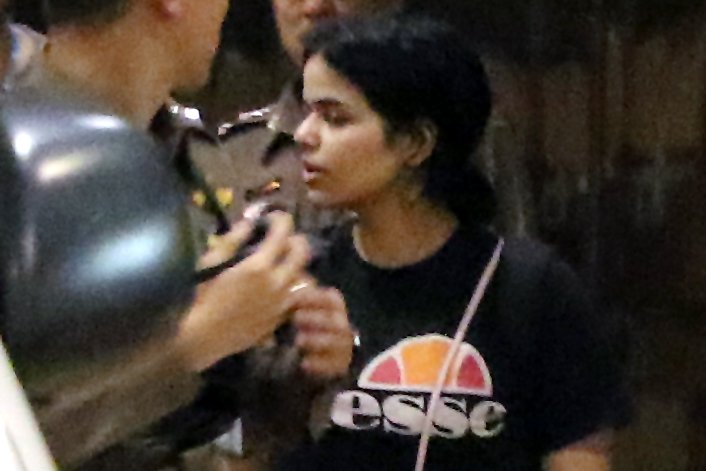Saudi Arabian teenager Rahaf Mohammed al-Qunun leaves as Thai police escort her from an airport hotel near Bangkok on January 7. Photo by EPA-EFE
Feb. 22 (UPI) -- Rahaf al-Qunun, a Saudi teenager who landed in Canada last month after being trapped in a Bangkok airport hotel room, was seen by an audience of millions around the world. However, the world may not have yet understood the true meaning of what happened.
Qunun, 18, escaped archaic Saudi laws that force women into what she accurately described as slavery. "We Saudi women are treated like slaves," she told the media. She may be young, but her description is spot-on.
Under Saudi law, a woman is part of a man, and not a separate individual. She must always be part of a man's flock and under his control. Until recently, the U.S. State Department website travel section stated that women in Saudi Arabia are the property of their male family members -- just like slaves were the property of their masters. If this is not slavery, what is?
It is time the world understood the position of women in Saudi Arabia as it is, and act accordingly. So far, the absolute monarchy in the kingdom has been able to convince the world that the way women are treated under its rule is a product of local culture and of Islam itself. But the world didn't blame the Dutch churches in South Africa or white Africana culture for the sin of apartheid, and it should not excuse the Saudi sin of enslaving women by blaming culture or religion.
Qunun may not be Harriet Tubman, but she was certainly a slave who got away and is now free. She is one of dozens, perhaps hundreds, of Saudi slaves that made it to freedom by escaping the country many of its citizens call a prison.
Last year, I was on the phone with Dina Ali AlYami, a 26-year old woman who managed to reach Manila before she was stopped by the Philippine authorities and forced back onto a private jet sent by the Saudi government. I asked her to let me speak to the female police officers who were guarding her. That police woman refused to tell me her name or her officer's name -- because she knew what she was doing was a crime. An hour later, AlYami was gone and forcibly taken back to that big prison, her homeland. AlYami's condition remains unknown. She told me her family would kill her if she was returned.
Over the past 15 years, I have spoken to many trapped women who reached out to me for help. I couldn't help most of them -- not for lack of trying but because we lack what I call the underground railroad for women slaves. We need one to free millions of enslaved women in my country, and the world must help. It's time to help Nada, Abeer, AlAnoud, Sahar, AlJawhara -- the many girls and women who sought my help, and millions other who share their status.
The United States can help by writing a clear policy on ending Saudi enslavement of women. The Congress, which today has the highest number of women in history, can advocate for that at every opportunity, and allocate funding for indigenous efforts to end Saudi gender apartheid. Since 2002, I've had countless meetings with the State Department's Office of Global Women's Issues, pushing them to develop a policy like this. They were not successful, and I gave up.
Saudi Arabia, the birthplace of Islam, is a standard-bearer for many Muslims today. The emancipation of Saudi women will be the shortest and fastest way to help empower Muslim women around the world.
Some will resort to the old trope that the Saudi leader Mohammed bin Salman has allowed women to drive, and change "must come gradually." Well, slaves, too, were allowed to drive their masters' coaches during American slavery.
If Mohammed is sincere in his wish to allow more rights for women, then it is more than curious that his own wife never appears in public. Wouldn't it be a good indicator of progress if the crown prince would allow his own wife to be seen by millions of women under his rule? This is important because we know that many female members of the ruling family live under oppression. The film Death of a Princess documented one case in which a cousin of Mohammed's was executed for trying to flee her slavery in the 1980s.
More recently, four of Mohammed's cousins, the daughters of the late King Abdullah, have been kept behind closed doors since September 2001. Hala, Maha, Sahar and AlJawhara have gone missing since King Salman took power in December 2015. Their fate remains unknown.
Until women in Saudi Arabia acquire legal personhood, the world must make Saudi government's life hard by placing the emancipation of women in every policy exchange they have with the Saudis, and by offering fleeing women a safe haven, just as Canada did recently.
Ali Al Ahmed is the founder and president of the Institute for Gulf Affairs.















